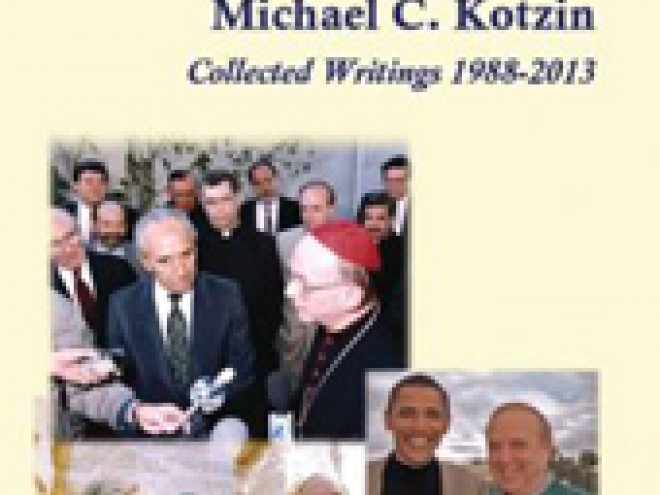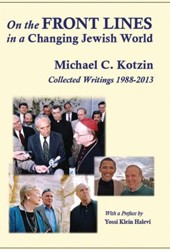Earlier this week, Michael C. Kotzin wrote a two-part series on radical Islamism’s war against the Jews. You can find part one here and part two here. He has been blogging here all week for Jewish Book Council’s Visiting Scribe series.
 In the summer of 2011, after having been an executive at the Jewish Federation of Metropolitan Chicago since 1988, I cut back my hours and changed my title from Executive Vice President to Senior Counselor to the President. Though throughout my tenure as a Jewish communal professional I had done a good deal of writing, those pieces were mostly on subjects closely related to my work. With the time that was freed up by the reduction in my Federation workload, I returned to involvement with literature of the sort that had defined my earlier career engagement when, with a Ph.D. in English from the University of Minnesota, I served on the faculty of Tel Aviv University for 11 years.
In the summer of 2011, after having been an executive at the Jewish Federation of Metropolitan Chicago since 1988, I cut back my hours and changed my title from Executive Vice President to Senior Counselor to the President. Though throughout my tenure as a Jewish communal professional I had done a good deal of writing, those pieces were mostly on subjects closely related to my work. With the time that was freed up by the reduction in my Federation workload, I returned to involvement with literature of the sort that had defined my earlier career engagement when, with a Ph.D. in English from the University of Minnesota, I served on the faculty of Tel Aviv University for 11 years.
Happily accepting an invitation to become a Visiting Professor at the University of Illinois at Urbana-Champaign in the spring of 2013, I taught a senior seminar on a topic I devised called “Reflections on Zion: American Jewish Writers and Israel.” It was an approach that brought together both of my professional careers, and I much enjoyed my return to the classroom while finding the students delightful and engaging.
Along with the teaching, as I dug into the texts I had selected I found myself once more preparing publications on literary subjects. I wrote an article on I.F. Stone’s 1946 Underground to Palestine demonstrating the manner in which that icon of the left was sympathetic to the Zionist dream, and I was invited to prepare a piece on In Search, the 1950 autobiography by the novelist Meyer Levin. (That essay is scheduled to appear shortly in Hebrew translation in a special issue of an Israeli journal focusing on Diaspora, Exile, and Sovereignty.)
The curriculum for the course consisted of essays by Louis Brandeis and Marie Syrkin, along with Saul Bellow’s To Jerusalem and Back and a number of fictional works. When papers were invited for a session on “Zionism and the Novel” for the January 2015 meeting of the Modern Language Association that took place in Vancouver. I contemplated returning to Victorian Literature, my earlier area of specialization, to write about George Eliot’s Daniel Deronda. But another paper had already been submitted on that topic and I decided to return to works from my class. The result was a presentation in which I talked about Zionist elements in Leon Uris’ Exodus (1958), Philip Roth’s The Counterlife (1986), and Michael Chabon’s The Yiddish Policemen’s Union (2007).
Written in very different times and circumstances by authors who themselves were different in many ways, the books, with differing purposes as well, nevertheless can be seen to treat parallel Zionist themes. Especially notable in this regard are their disparate yet overlapping portrayals of the basic Zionist concept regarding the creation of a “new Jew.”
For Leon Uris, in his iconic bestseller, the epitome of that type is Ari Ben-Canaan, a rugged Sabra fighter. In a contemporary talk, Philip Roth expressed no patience with the Jew as tough guy. But later, in his own complex, dazzling novel, the figure of the new Jew again has a gun while now being split into Henry Zuckerman, a dentist from New Jersey who finds his Jewish identity by going to Israel, and Mordecai Lippman, a zealous settler leader who picks up the fighter image.
For Michael Chabon, writing still later, when America’s – and American Jewry’s – relationship with Israel had become even more complicated, the treatment of these and related themes takes a further turn. While the book is sometimes regarded as offering a post-Zionist perspective, I’m more inclined to see it as set in an alternative “pre-Zionist” world, where Yiddish is the lingua franca; where there is no Israel (the state having been destroyed almost immediately after its creation); and where Jews are shown living in a condition of permanent exile.
This book’s Jew with a gun is a detective out of a noir novel of the 1920s and ‘30s who is involved not with the collective redemption of the Jewish people in their homeland, as was the case with Exodus, nor with an individual’s new life in a communal setting in that land, as in The Counterlife, but with personal redemption in exile and the achievement of “union” only with his former wife.
The course I taught ended by focusing on two short stories by Nathan Englander and on Yosef Yerushalmi’s lone, posthumous work of fiction. Englander’s stories, we observed, show a familiarity with Israel as it has become for those American Jews for whom it remains a central part of their identity. In the story by Yerushalmi, a highly regarded New York-based scholar of an earlier generation, many of the themes of traditional Zionist thought are recapitulated in a striking fashion.
All in all, this course’s foray into the treatment of Israel by select American Jewish writers over the last century, while hardly comprehensive, showed me and my students that there is richness to be mined by exploring the topic and its evolution. While not one of the most widespread subjects treated by American Jewish authors, the subject of Zionism, Israel, and their meaning to American Jews has been significantly drawn upon by a range of such writers, a matter meriting further examination.
Michael C. Kotzin is a longtime Jewish communal professional and former professor of English Literature at Tel Aviv University. He has been an executive at the Jewish Federation of Metropolitan Chicago since 1988 and is the author of the recently published On the Front Lines in a Changing Jewish World: Collected Writings 1988 – 2013.
Related Content:
- 5 Alternate Histories of Zion by Adam Rovner
- The Best Overlooked American Jewish Novelist bv David Evanier
- Reading List: Classic Jewish Literature
Michael C. Kotzin is a longtime Jewish communal professional and former professor of English Literature at Tel Aviv University. He has been an executive at the Jewish Federation of Metropolitan Chicago since 1988 and is the author of the recently published On the Front Lines in a Changing Jewish World: Collected Writings 1988 – 2013.
Radical Islamism’s War Against the Jews: Who Cares? (Part 1)
Radical Islamism’s War Against the Jews: Who Cares? (Part 2)



